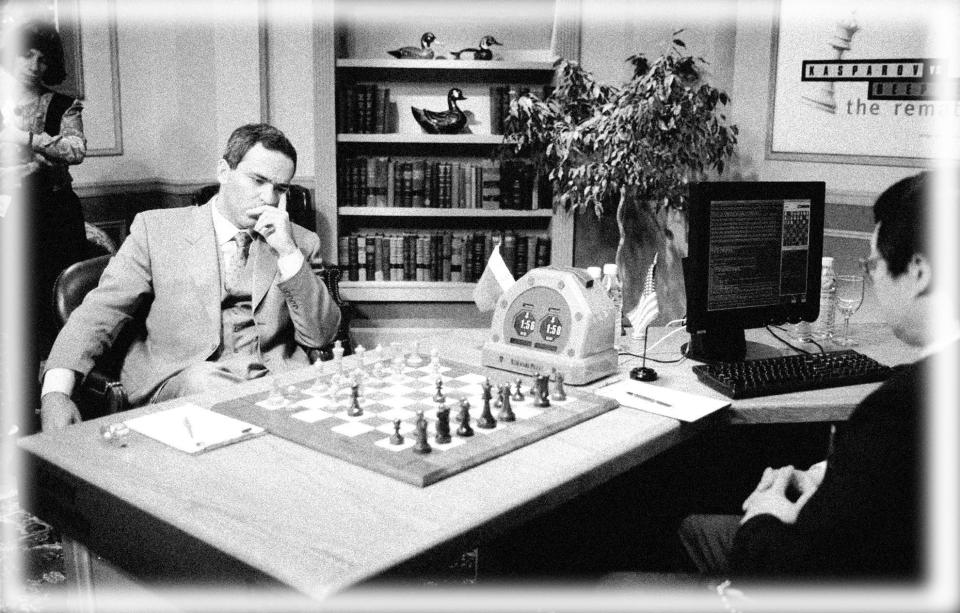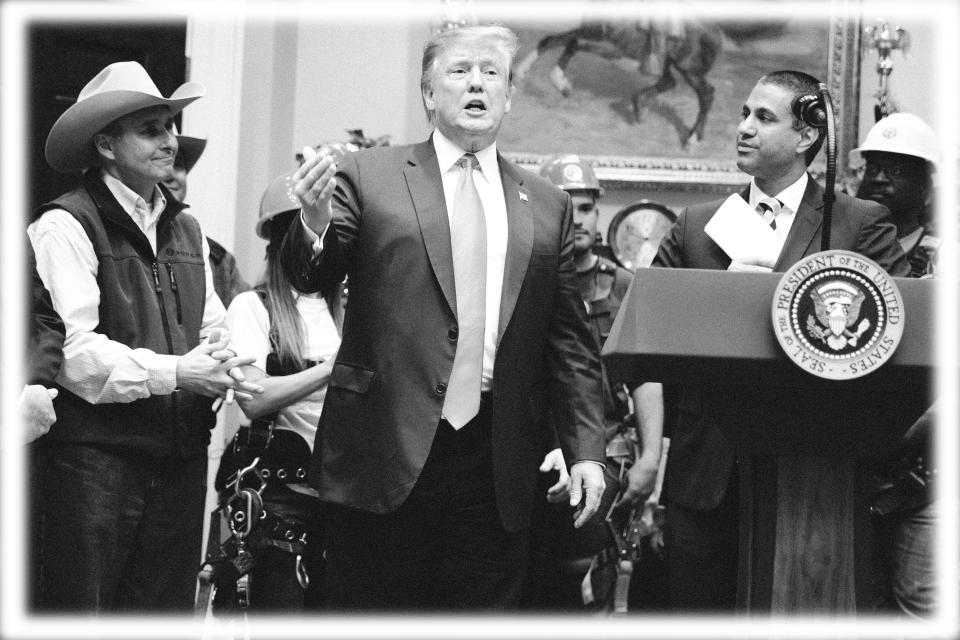Frightened by artificial intelligence? These candidates have a solution for that.
Presidential elections are decided by many things: media exposure, financial backing, personal chemistry, timing and luck. Policy positions often are just a way of signaling where a candidate stands on the political spectrum. But 2020 is shaping up to be different, the most ideas-driven election in recent American history. On the Democratic side, a robust debate about inequality has given rise to ambitious proposals to redress the imbalance in Americans’ economic situations. Candidates are churning out positions on banking regulation, antitrust law and the future effects of artificial intelligence. The Green New Deal is spurring debate on the crucial issue of climate change, which could also play a role in a possible Republican challenge to Donald Trump.
Yahoo News will be examining these and other policy questions in “The Ideas Election” — a series of articles on how candidates are defining and addressing the most important issues facing the United States as it prepares to enter a new decade.

From self-driving cars to augmented reality to advancements in medicine, agriculture and weaponry, many aspects of everyday life and a large share of the U.S. economy and military will be transformed by artificial intelligence in the not-too-distant future.
In the U.S., AI innovation is being driven by massive investments in research and development at the technology behemoths — Google, Facebook, Apple, Amazon and Microsoft. They stand to gain the most from these technologies by leveraging the huge amounts of data that users have provided. But more and more businesses in all kinds of industries are looking to AI to increase productivity, service and their bottom lines. Hospitals are testing how AI can enhance care, school districts are looking at AI-equipped cameras that can spot guns, and human resources departments are using AI to sift through job applications. Government agencies, including law enforcement, are looking for ways to harness this next technological revolution to meet their ends.
But looming over AI development are warnings from top scientists, including the late Stephen Hawking, who said in a 2014 BBC interview that “the development of full artificial intelligence could spell the end of the human race.”
Artificial general intelligence — a program that could replicate (or arguably constitute) consciousness — may be far off, but the technology in its current form may already be outpacing the legal and ethical frameworks for its safe and responsible deployment. Important debates about how AI automation will affect data privacy, civil rights and national security have crept out of the confines of academia onto the national political stage.
The perils of AI are already on display in China, which is deploying AI facial recognition technology to strengthen its Orwellian state surveillance infrastructure — from helping police catch jaywalkers to profiling ethnic minorities. In the near term, the biggest AI concern in the U.S. is its impact on labor markets. And while the Trump administration focuses on illegal immigration as the greatest threat to American workers, some of the presidential candidates preparing to challenge him in 2020 are homing in on the greater potential threat presented by AI-equipped automation.
In a video announcing his 2020 presidency, Sen. Bernie Sanders said, “We need to understand that artificial intelligence and robotics must benefit the needs of workers, not just corporate America and those who own that technology.”

Estimates vary on the number of workers who may be displaced by technology that makes machines better than humans at certain jobs. But by some predictions, the rate of job loss will exceed that of the Industrial Revolution. A 2013 study from Oxford predicted that up to 47 percent of American jobs could be at risk by 2030. More recent studies are less dire: McKinsey’s 2017 research estimates that 23 percent of the workforce might be threatened by automation, assuming companies adopt these technologies at a middling pace. And while researchers also predict that millions of new jobs will be created, there is bound to be at least short-term pain for workers who must transition to stay relevant in an AI-driven economy. First on the firing line may be less-educated workers who perform repetitive tasks, such as machine operators, retail workers and fast-food preppers. But relatively well-educated people who do administrative tasks, such as accounting or drafting legal documents, may also be at risk. Economists theorize that AI could further concentrate wealth and power at the very top and have an impact on the lower, middle and even upper-middle class.
On the campaign trail, Democratic presidential candidate Andrew Yang frequently talks about the 3.5 million truckers in the U.S. who he says stand to lose their jobs in the next five to seven years due to self-driving trucks. According to the second annual AI Index report, subsets of AI called “computer vision” and “object segmentation” that are used in self-driving vehicles have seen dramatic gains in the last three years in precision and speed, so Yang’s prediction may not be far off.
“What concerns me is if AI is even good enough to drive trucks and conduct customer service calls and other tasks and be completely mindless in other regards, that would still be enough to displace millions of American workers and cause epic levels of distress, displacement and even violence,” he told Yahoo News.
From self-driving cars to facial recognition systems, these technologies are bringing forth a tidal wave of change that at its extreme has been characterized as an existential threat to humanity and by more restrained voices as nothing short of a Fourth Industrial Revolution.


Many AI watchers point to the moment in 2016 that a computer program created by Google’s DeepMind division beat one of the best players in the ancient Chinese game of Go as a rocket booster in the trajectory of AI. It did so not just through powerful computing, but through a process of learning and revising — a new mastery that at the time experts thought was still a decade away. The last time a computer had achieved a comparable feat was in 1997, when the IBM program Deep Blue beat Garry Kasparov at chess, but AlphaGo was different in an important way: Unlike Deep Blue, which was programmed with thousands of rules to help it make the best chess moves, AlphaGo and its latest incarnation, AlphaGoZero, replace those rules with deep neural networks that mimic the brain and the way it interprets data. Essentially, AlphaGo taught the game to itself, in a fraction of the time it takes human experts. In defeating Lee Se-dol and Ke Jie, the computer showed it could achieve “superhuman performance” (Ke said it was “like a god of Go”). In a 2016 interview with Dennis Hassabis published in the journal Nature, the Google DeepMind CEO described how “this means that similar techniques could be applied to other AI domains that require recognition of complex patterns, long-term planning and decision-making.”

The first 2020 presidential candidates to make AI an explicit part of their platforms were former Rep. John Delaney and entrepreneur Andrew Yang, who in separate interviews with Yahoo News agreed that Washington generally lacks the knowledge about developments in technology to properly legislate.
In 2017, during his last term in Congress, Delaney co-founded the bipartisan AI Caucus to inform members about the nascent technology and develop policy toward a national AI strategy. Delaney is an optimist when it comes to the net effects AI will have on humankind.
“Before any of these doomsday scenarios come true, which a lot of people like to talk about and scare people with, I think there are a million opportunities for there to be human intervention to make sure this stuff plays out the way it should,” he said.
Delaney’s national AI policy would focus on the impacts on the workforce, national security, privacy and “programming bias,” the unintended discriminatory outcomes of some machine-learning algorithms. His emphasis on AI as a campaign issue may set him apart, but his proposals are generally mainstream and broadly popular. He would address worker displacement with traditional forms of government financial assistance and job training, and close the skills gap by improving schools.
His one outside-the-box idea is that society should make up for job losses by converting unpaid family care to paid work. The idea is an extension of a theory among academics, such as Anne-Marie Slaughter, who say that unpaid work done by family caregivers should be considered in a country’s GDP. Delaney goes even further by proposing that people who are caring for aging parents or children, for example, should be compensated.

“We need to look at a lot of jobs that exist in society right now, where people are doing things that add value but they don’t get paid for it,” he said. In his interview with Yahoo News, he didn’t offer details about how this could be implemented.
For every new opportunity Delaney sees AI making possible, Yang sees new potential pitfalls. Author of a book titled “The War on Normal People,” Yang is appealing to the same blue-collar workers without college degrees who helped elect Trump, warning them of the destabilizing effects of millions of workers being replaced by machines such as self-driving trucks. His signature policy is a universal basic income (UBI), which he told Yahoo News “is necessary to help Americans transition through what is the greatest economic and technological transformation in the history of our country.”
“It’s called the Fourth Industrial Revolution, and it led directly to Donald Trump being elected,” he said.
Yang’s plan, which he calls “the Freedom Dividend,” calls for giving every American over the age of 18 $1,000 a month with no strings attached — meaning no work requirements or means testing. To pay for the plan, which could cost upwards of $3.8 trillion, Yang would impose a value-added tax (a form of national sales tax) of 10 percent, as well as a carbon-emissions tax that would also encourage energy efficiency. Yang’s talking points reflect the thinking of UBI zealots who see it as a pathway to a utopian future where homelessness and poverty are eliminated, unleashing the full force of human creative potential. He predicts that the stimulus of a guaranteed monthly check will expand the economy and create millions of jobs.
“Americans are waking up to the fact that a thousand dollars a month would be a game changer for tens of millions of Americans,” he said. “It’s a trickle-up economy.”

A handful of bills in Congress that deal with AI have been introduced, including one that Delaney sponsored called the Future of AI Act, which would set up a federal advisory committee on AI matters. Sen. Kamala Harris, another Democratic presidential candidate, is among a bipartisan group of senators who introduced the AI in Government Act. While those bills languish in Congress, Trump is using his executive powers to attempt to bring the nation up to speed on AI and the next-generation wireless technology 5G. In February, Trump issued his Executive Order on Maintaining American Leadership in Artificial Intelligence, creating the National Science and Technology Council’s Select Committee on AI to coordinate the work of federal agencies. Trump’s proposed budget for 2020 calls for $850 million in AI research and development, which pales in comparison to the tens of billions of dollars being directed at the research and development of AI by China’s government.

Concerns about AI have surfaced in relation to programming bias in AI algorithms for hiring or mortgage lending. Lawmakers have cited instances of racial and gender bias that may run afoul of civil rights laws, which have generally been interpreted to outlaw practices that may have an even unintended discriminatory effect. But Washington has been slower to move on this and other issues, including privacy, than some other countries. While Trump’s executive order references ethics and safety multiple times, no clear standards of accountability are spelled out. Recently, evangelical leaders in the U.S. issued a statement of principles to call for AI development that is in accordance with “the moral will of God.” And the European Commission has promulgated specific ethical guidelines on AI.
In recent years, UBI has been making the rounds in intellectual circles and has high-profile proponents in Silicon Valley. The idea has also gained traction in the left wing of the Democratic Party. Basic income is discussed briefly in the Green New Deal, espoused by Rep. Alexandria Ocasio-Cortez, and the California state Democratic Party has made UBI part of its platform. Small-scale experiments are being carried out in places like Stockton, Calif., and in New Jersey, Newark Mayor Ras Baraka recently announced he’s exploring a pilot program for UBI.
Basic income under the guise of tax credits has been introduced in Congress in the past by both Democrats and Republicans, but this legislation has never taken hold. Whether the onslaught of AI automation will change that is yet to be seen.
Erik Brynjolfsson of MIT’s Initiative on the Digital Economy said in a 2017 interview: “I agree with Elon Musk that we will almost surely have some sort of universal basic income when machines reach the point where they can do most or all of the work that humans do. But that’s not where we are today. And we likely won’t be there for decades.”
Cover thumbnail photo illustration: Yahoo News; photos: Phil Long/AP, Gary Miller/FilmMagic via Getty Images, Getty Images, AP
_____
Read more from Yahoo News:
Trump was ‘fighting for his political life,’ his former lawyer says
'It's already begun': Feedback loops will make climate change even worse, scientists say
Revealed: The U.S. military's 36 code-named operations in Africa
Video shows extensive fire damage inside Notre Dame Cathedral
Concerns mount over Jared Kushner's role in GOP money machine





